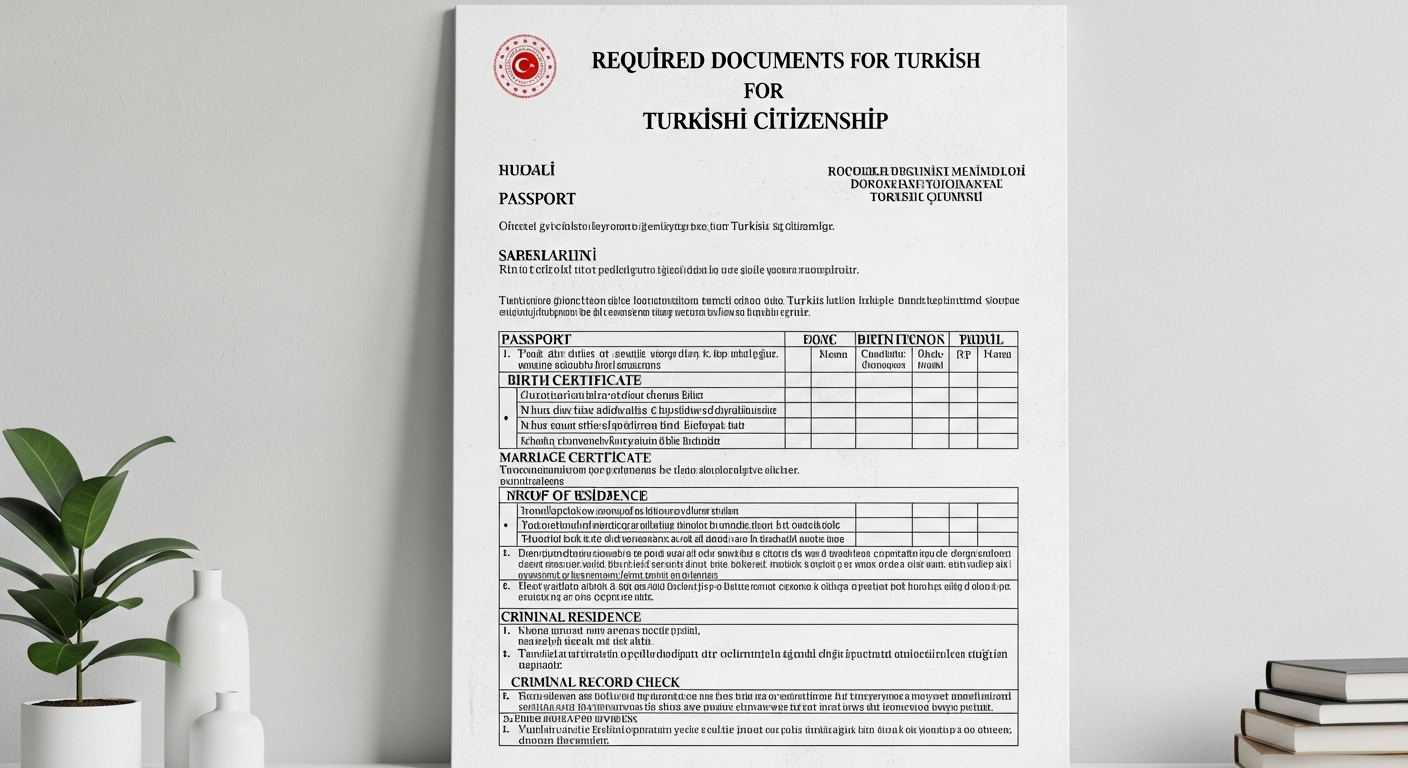Required Documents for Turkish Citizenship in 2025
A complete 2025 guide to all documents needed for applying for Turkish citizenship through investment, marriage, or naturalization.

Introduction
Thinking about becoming a Turkish citizen? You're not alone. Thousands of people each year apply for Turkish citizenship, drawn by the country’s rich history, cultural diversity, beautiful landscapes, and strategic location. Whether you're pursuing citizenship through investment, marriage, or naturalization, there's one crucial factor that everyone must face—paperwork. Yes, the process can be a bit of a maze, but once you understand the exact documents you need, things start falling into place.
Applying for Turkish citizenship isn’t just about filling out a form or two. It involves collecting, legalizing, and submitting several official documents. These documents not only prove who you are but also show that you meet the qualifications under Turkish law. And missing just one item? That could set you back weeks or even months.
Understanding the documentation process is vital because the Turkish government is meticulous about verification. You can’t afford to make mistakes or skip steps. Think of this as building a bridge—you need every plank in place before you can cross over to your new life as a Turkish citizen.
In this guide, we'll walk you through every document you’ll need depending on your specific route to citizenship. We’ll also highlight common pitfalls, provide real-world tips, and ensure you're not caught off guard. Ready to make Turkey your new home? Let’s break down exactly what you’ll need to make that dream a reality.
Types of Turkish Citizenship Applications
Before diving into the documents, it’s essential to know the different paths available. Each pathway has its own set of requirements and paperwork, so knowing where you stand helps you prepare better.
1. Citizenship by Birth
This is the most straightforward. If you’re born to at least one Turkish parent, you automatically qualify. However, proving lineage may still require certain documentation like birth records, family registry, and national identity documents.
Citizenship by descent (jus sanguinis) applies if at least one parent is a Turkish citizen. For full details, see Turkish Citizenship Eligibility Criteria – Complete Guide 2025.
2. Citizenship by Marriage
Been married to a Turkish citizen for at least three years? You might qualify. But remember, you’ll need to prove that the marriage is genuine and ongoing. That means joint residency records, shared financial responsibilities, and sometimes even interviews.
Remember the 3‑year requirement and the need for proof of marriage authenticity. For complete insight into marriage-based eligibility, refer to: Turkish Citizenship Eligibility Criteria – Complete Guide 2025.
3. Citizenship by Investment
This option has gained popularity among international investors. By investing at least $400,000 in real estate or depositing a substantial amount in a Turkish bank, you may become eligible. The catch? You'll need bulletproof documentation of every financial move.
If you're considering this route, the minimum investment thresholds and requirements are fully detailed in the Deal TR Golden Visa guide and the Eligibility Criteria guide.
4. Citizenship by Naturalization
Living in Turkey legally for at least five continuous years? You might qualify through naturalization. You’ll need to show integration into Turkish society—language skills, job, social life, and more.
The five‑year residence requirement, language expectations, and stability conditions are thoroughly explained in the Eligibility Criteria guide.
5. Exceptional Circumstances
Sometimes, the Turkish government grants citizenship for humanitarian reasons or if you’ve made an exceptional contribution (like being an academic or sports star). This process is rare but possible, with documentation tailored to the case.
Each pathway opens a different door—but they all require solid documentation. Up next, we’ll look at what’s needed across the board.
General Requirements for All Applicants
No matter which route you’re taking, some documents are universally required. These form the backbone of your application and help Turkish officials verify your identity and eligibility.
1. Proof of Identity and Nationality
At the top of the list is your passport. It must be valid and not near expiry. Along with it, you’ll need a notarized and translated copy into Turkish. If you're stateless, alternative ID issued by the UN or your current host country will be necessary.
2. Birth Certificate
This document confirms your identity, date of birth, and sometimes parents' names. It must be official, apostilled, and translated into Turkish by a sworn translator. It’s also essential in verifying family ties for those applying via descent or marriage.
3. Marital Status Documentation
Whether you're single, married, divorced, or widowed, you need to prove it. This usually means a marriage certificate, divorce decree, or death certificate of a spouse. Again, all must be legalized and translated.
4. Clean Criminal Record
Turkey requires that all applicants present a police clearance certificate from their home country and any country they've resided in over the past 5 years. It should be recent—usually issued within the last 6 months—and fully translated and notarized.
5. Language Proficiency (for Naturalization)
Although not always strictly enforced, you may be asked to demonstrate basic Turkish language skills, especially for naturalization. Some applicants are interviewed or tested.
This forms the core of your citizenship file. Missing even one of these documents can result in immediate rejection or prolonged delays. Let's go deeper into the specific documents needed for each citizenship path.
Core Documents Required for Turkish Citizenship
Let’s talk paperwork—the actual stack of documents you'll need to compile. The more complete and organized your application is, the smoother things go. Here’s a breakdown of the must-haves for everyone applying:
1. Valid Passport
Your passport is your primary ID in Turkey. Ensure it’s valid for at least 6 months. You’ll also need to provide a notarized Turkish translation and often a copy of your entry stamps or visa pages.
2. Birth Certificate
You’ll need a government-issued birth certificate, legalized with an apostille, and translated into Turkish. This confirms your origin and is vital for applicants born outside Turkey.
3. Marital Status Certificate
This proves whether you're married, single, divorced, or widowed. For married applicants, include your spouse’s information. If you’re divorced, include the divorce decree. For widows/widowers, include the death certificate.
4. Proof of Residence in Turkey
This could be your residence permit, Ikamet card, or utility bills and rental contracts. If you’ve lived in multiple places, provide proof for each residence over the past 5 years.
5. Biometric Photographs
Most applications require 4–6 recent biometric photos, taken on a white background. They should meet international standards (35x45mm) and not be older than six months.
6. Financial Self-Sufficiency Proof
Applicants must prove they can support themselves and their families. This may include bank statements, salary slips, or property ownership documents.
These documents form the foundation. They must all be recent, legal, and accurately translated. Up next, we’ll look into the extras needed for those applying via investment.
Additional Documents for Citizenship by Investment
If you're applying for Turkish citizenship through the investment route, the paperwork becomes more complex—and more critical. The Turkish government takes financial verification very seriously, so every detail must be documented, legalized, and accurate. Here's what you need to gather:
1. Proof of Investment
You must present official documents confirming your investment. Depending on the investment type, this might include:
Real Estate Investment: Provide the title deed (Tapu), along with a property valuation report from a government-approved agency. This confirms the property’s value meets the $400,000 threshold.
Bank Deposit: Submit bank receipts, a confirmation letter from the bank, and official account statements showing the funds remained untouched for the mandatory period (usually 3 years).
Capital Investment: For those investing in a business, you'll need commercial registration, shareholding certificates, and notarized documents showing your stake in the company.
2. Certificate of Conformity
This is issued by the relevant Turkish authority—either the Ministry of Environment and Urbanization, Banking Regulation and Supervision Agency (BDDK), or Ministry of Industry and Technology—to confirm that your investment meets the required legal criteria.
3. Tax Identification Number
To invest or do any official transaction in Turkey, you must obtain a Turkish Tax ID. This is easy to get from the local tax office with your passport.
4. Proof of No Loan Obligation
If you bought property, it must be free of loans or mortgages. You’ll need a document from the Land Registry stating there are no financial liabilities tied to the property.
5. Official Receipts
Turkey requires that all financial transactions for citizenship investment go through Turkish banks. You must present bank-stamped official receipts for each transaction to prove the payment trail.
In short, this pathway demands airtight financial records. Even one missing paper or discrepancy can delay or even void your application. It’s highly recommended to work with a certified attorney or real estate agent to ensure compliance.
Additional Documents for Citizenship by Marriage
Applying for citizenship through marriage may seem simpler, but the Turkish government takes extra measures to ensure the relationship is genuine and not just for immigration benefits. Here's what you'll need:
1. Valid Marriage Certificate
You’ll need a legalized and translated marriage certificate that clearly states the marriage date and both parties’ names. If the marriage was registered outside Turkey, it must be apostilled or legalized via the Turkish consulate.
2. Proof of a Minimum 3-Year Marriage
You can’t just marry and apply the next day. Turkish law requires a minimum of three years of marriage before applying. You'll need documents like:
Joint bank accounts
Shared property ownership
Children’s birth certificates (if any)
Photos and travel logs together
3. Joint Residency Documentation
You must show that you’ve lived together continuously. This could include:
Rental agreements or deeds with both names
Utility bills in both names
Proof of shared address registrations (from the civil registry)
4. Statement of Continuity and Good Faith
Both spouses may need to write a statement declaring that the marriage is ongoing, genuine, and not based on convenience. You might also be asked to attend an interview with Turkish officials to verify this.
5. Turkish Spouse’s Documents
You’ll need a copy of your Turkish spouse’s ID card, residence address, and criminal record. If they’ve had a previous marriage, divorce or death certificates may be required as well.
Marriage-based citizenship is less about financials and more about the relationship. Be honest, transparent, and ready to prove your bond with your Turkish spouse.
Documents for Citizenship by Naturalization
Naturalization is often the choice for those who’ve spent significant time living and working in Turkey. The process is document-heavy and deeply scrutinized to ensure applicants are genuinely integrated into Turkish life.
1. Proof of Long-Term Residency
You need to show that you’ve lived in Turkey for at least five years continuously. Required documents include:
Residence permits (Ikamet) for each year
Address registration documents
Visa and entry-exit records
2. Employment or Income Documentation
To prove financial stability, submit:
Work permits (Çalışma İzni)
Employment contracts
Salary slips or bank statements
Self-employment or business ownership documents
3. Integration Proof
Turkey wants naturalized citizens to be part of society. Documents may include:
Turkish language course certificates
Social involvement records (sports clubs, community organizations)
School records of children
Photos and logs of daily life in Turkey
4. Clean Criminal Record
This is a must, and you’ll need to get clearance from both Turkey and your home country.
5. References
Sometimes, you’ll be asked to provide references or letters from Turkish citizens vouching for your character, employment, or social standing.
Naturalization can take longer than other routes, but if your documents are complete and you’ve built a real life in Turkey, your chances are high.
Exceptional Citizenship Applications
This category is rare but important. It applies to individuals who are granted citizenship due to exceptional circumstances—either by direct contribution to Turkey or due to humanitarian needs. Let’s explore the documents needed here:
1. Government Recommendation
A formal letter from a Turkish ministry or government office is often the anchor document. This letter will recommend you for citizenship based on:
Exceptional skills (sports, science, arts)
Economic contribution
National interest
2. Supporting Achievements
You must prove your contribution with documents like:
Certificates, awards, or accolades
Academic publications
Business investments or patents
Media features or interviews
3. Humanitarian Grounds
For those applying on humanitarian grounds, you’ll need:
Proof of persecution or refugee status
Letters from UNHCR or humanitarian organizations
Medical records, affidavits, or crisis documents
4. Identity and Residence Proof
Like all applicants, you must provide the standard ID documents—passport, birth certificate, biometric photos, and proof of stay in Turkey.
This pathway doesn’t follow a cookie-cutter rulebook. Each case is unique, and decisions are made directly by presidential authority. Strong documentation and legal representation are key.
Legalization and Translation Requirements
Let’s not forget the backbone of the entire citizenship application: legalization and translation. Turkey is strict about document validity, so even if you have all the right papers, failure to translate or legalize them properly can tank your application.
1. Notarization in Turkey
Any foreign document must be notarized in Turkey. This involves taking the translated version to a Turkish notary who verifies its authenticity and stamps it officially.
2. Apostille or Consular Legalization
Depending on your home country, documents must either be:
Apostilled: For countries that are part of the Hague Convention, the Apostille stamp validates the document internationally.
Consular legalized: For non-Hague countries, documents must be legalized at the Turkish consulate in your home country.
3. Certified Turkish Translation
Every foreign-language document must be translated into Turkish by a sworn translator. This translation must be:
Attached to the original
Notarized in Turkey
Up to date (translations older than 6 months may be rejected)
4. Tips for Smooth Legalization
Always scan and save digital copies of everything.
Use official document courier services if sending papers internationally.
Check with a lawyer or consulate before finalizing translations or apostilles.
Failure to follow these rules can lead to rejections, delays, or even bans from applying for a set period.
Application Process Step-by-Step
Now that you know what documents are needed, let’s walk through the actual application process for Turkish citizenship. Whether you’re applying through marriage, investment, or naturalization, the application follows a standard structure with defined steps.
Step 1: Prepare and Organize Your Documents
Start by gathering all required documents based on your application type. Make sure everything is:
Up-to-date
Apostilled or legalized
Translated into Turkish
Notarized by a Turkish notary
Use a checklist to double-check each item. Missing one document can cause weeks of delays.
Step 2: Apply at the Local Civil Registry Office (Nüfus Müdürlüğü)
Once everything is ready, you’ll submit your application to the Provincial Directorate of Population and Citizenship Affairs. This can vary by city, so always check your local branch's requirements or website.
Step 3: Pay the Application Fee
Fees vary depending on your application type, but expect to pay for:
Application submission
Notarization and translation services
Additional processing fees
Fees can typically be paid at tax offices or designated bank branches.
Step 4: Attend an Interview (if required)
Most applicants—especially those applying via marriage or naturalization—are required to attend an interview. This is usually conducted in Turkish and covers:
Personal background
Motivation for acquiring citizenship
Integration into Turkish society
Be honest, stay calm, and bring all your original documents.
Step 5: Wait for Processing and Approval
This can take anywhere from 3 months (for investment cases) to over 12 months (for naturalization). Your application will be evaluated by:
The Provincial Directorate
Ministry of Interior
Presidency of Turkey
You’ll be notified by mail or SMS once a decision has been made.
Step 6: Receive Your Citizenship Certificate
If approved, you’ll receive an official Turkish citizenship certificate (Vatandaşlık Belgesi). Congratulations—you're now a Turkish citizen!
Step 7: Register Your Status
Once you have your certificate, register yourself with:
The national ID system
Social security and healthcare services
Local municipality for voting rights
Step 8: Apply for a Turkish Passport
With your citizenship confirmed, you’re eligible for a Turkish passport. Visit the General Directorate of Civil Registration and Nationality or use the e-Government portal for online booking.
This process might seem long, but being prepared and thorough makes a massive difference.
Common Mistakes to Avoid
Even a well-intentioned application can fall apart if you're not careful. Here are some of the most common mistakes people make when applying for Turkish citizenship—and how to avoid them.
1. Submitting Expired Documents
One of the biggest mistakes is using outdated documents, like expired passports, old residence permits, or outdated translations. Always ensure that all documents are:
Issued within the last 6 months (for police records, financial statements, etc.)
Legally valid at the time of submission
2. Incomplete Documentation
Applicants often skip documents they think are “optional” or “not necessary.” If a document is listed—even as optional—it’s better to include it. Some examples include:
Leaving out the marriage certificate for investment applicants who are married
Forgetting to submit old residence permits for naturalization
Not including official receipts for bank transfers
3. Improper Translation or Notarization
Failing to use certified Turkish translators or skipping the notarization step can invalidate your entire file. Make sure to:
Hire sworn translators registered in Turkey
Always notarize the translated versions
Keep receipts and stamps from the translation office
4. Applying with Incomplete Investment Documentation
Especially with real estate or financial investment, many applicants forget to submit proof of:
Valuation reports
Turkish Lira conversion receipts
Official receipts from the Turkish bank
This is a red flag for authorities and may lead to rejection.
5. Failing the Interview
Not being able to communicate in basic Turkish or showing signs that your marriage or investment is not genuine can result in a denied application. Prepare for the interview seriously and be ready to explain your motivations clearly.
Avoiding these pitfalls significantly boosts your chances of success.
Tips for a Successful Application
So, what separates a successful application from one that’s delayed or rejected? These tips will help you put together a solid, stress-free file that gets noticed for all the right reasons.
1. Start Early and Stay Organized
Don’t wait until the last minute. Start gathering your documents 2–3 months before you intend to submit the application. Use a spreadsheet or checklist to track what’s complete and what’s pending.
2. Hire a Local Immigration Lawyer or Consultant
A Turkish immigration expert can:
Translate and notarize documents correctly
Help fill out application forms
Book appointments and follow up with government offices
They’ll save you time, reduce stress, and help avoid mistakes.
3. Double-Check All Requirements
Laws and requirements change. Visit the official website of the Turkish Ministry of Interior or local immigration offices to get the most recent updates. Don’t rely solely on blogs or hearsay.
4. Provide More Than the Minimum
Including extra supporting documents—photos, utility bills, or community involvement records—can strengthen your case. It shows effort and transparency.
5. Keep Digital Copies
Scan every document and save it in a secure folder (preferably cloud-based). It’ll help if you lose the physical copies or need to resend them later.
6. Stay Patient and Professional
Government processes can be slow. Avoid frequent follow-ups or complaints. Always maintain a respectful tone in communications, both written and in person.
These tips can make all the difference between frustration and smooth success.
Renewal or Correction of Documents
Over time, you may need to renew or correct certain documents to keep your file valid. Here’s how to stay ahead of the curve.
1. Expired Passports or IDs
If your passport is expired or near expiration, you’ll need to:
Contact your home country’s embassy or consulate in Turkey
Schedule an appointment for renewal
Get the new passport translated and notarized
2. Reissuing Lost or Damaged Documents
Lost your birth certificate or marriage license? Request reissued versions from your home country’s civil registry. Ensure the new documents are:
Officially stamped
Apostilled or legalized
Translated and notarized in Turkey
3. Fixing Inconsistencies
If your name is spelled differently on various documents, or if your date of birth doesn’t match across records, fix it before applying. Some steps include:
Submitting a name correction affidavit
Getting clarification from your home country’s consulate
Providing court documents or official name-change declarations
4. Translating New Documents
Every updated document must be translated again and notarized. Older translations, even if technically accurate, may be rejected if they’re outdated.
5. Updating Turkish Authorities
If you change your address, marital status, or any important detail, inform the Nüfus Müdürlüğü or immigration office immediately. Keeping your file current prevents future complications.
Staying proactive with your documentation keeps your citizenship status clean, clear, and worry-free.
Turkish Citizenship Approval and Next Steps
Once your application is approved, you’re not quite finished. There are a few final administrative steps to complete before you can call yourself a full-fledged Turkish citizen.
1. Receiving Your Approval
You’ll typically get a letter or notification via mail, SMS, or e-Government portal informing you of your approval. This is followed by an invitation to collect your citizenship certificate.
2. Citizenship Certificate
This is an official legal document proving your new status. Keep it safe and make multiple certified copies for future use.
3. National ID Registration
Register for a Turkish National ID card (Kimlik) at the local civil registration office. You’ll need:
Your citizenship certificate
Biometric photo
Proof of address
4. Apply for a Turkish Passport
Visit the nearest passport office or book an appointment online via nvi.gov.tr. The process is quick if you already have your national ID.
5. Update Legal and Financial Records
Now that you’re a citizen, update your records:
Bank accounts
Tax files
Health insurance
Social security registration
6. Explore Your New Rights
As a Turkish citizen, you can:
Vote in elections
Travel visa-free to over 110 countries
Work, study, or retire without any foreigner restrictions
It’s a moment of transformation—and it all starts with a piece of paper.
Conclusion
Getting Turkish citizenship is a life-changing milestone. But the journey begins—and hinges—on documentation. Whether you're applying through investment, marriage, or naturalization, one thing remains constant: the need for thorough, accurate, and well-prepared paperwork.
From passports and birth certificates to bank receipts and translation stamps, each piece tells a part of your story. When you put them together properly, the Turkish government sees not just a file—but a person ready to become part of its society.
Prepare ahead, stay organized, get help when needed, and avoid shortcuts. This isn’t just bureaucracy—it’s the bridge to your new identity, your future in Turkey, and all the opportunities that come with it.
FAQs
1. Can I apply for Turkish citizenship without a lawyer?
Yes, but hiring a lawyer or consultant can simplify the process, especially for translation, notarization, and legal guidance.
2. What happens if my documents are not in Turkish?
They must be translated into Turkish by a sworn translator and notarized. Untranslated documents will not be accepted.
3. Is there a digital application option?
Some parts of the process can be started online via e-Devlet (e-Government portal), but physical document submission is usually required.
4. How long are the documents valid?
Most documents (like police records and financial statements) must be issued within the last 6 months. Check each requirement closely.
5. Do children need separate documents?
Yes, each child needs a birth certificate, photos, and possibly a translated and notarized passport. Include them in your family application.
Have Question Or Suggestion ?
Please Share Your Thought, To Make It Real


